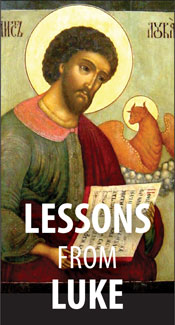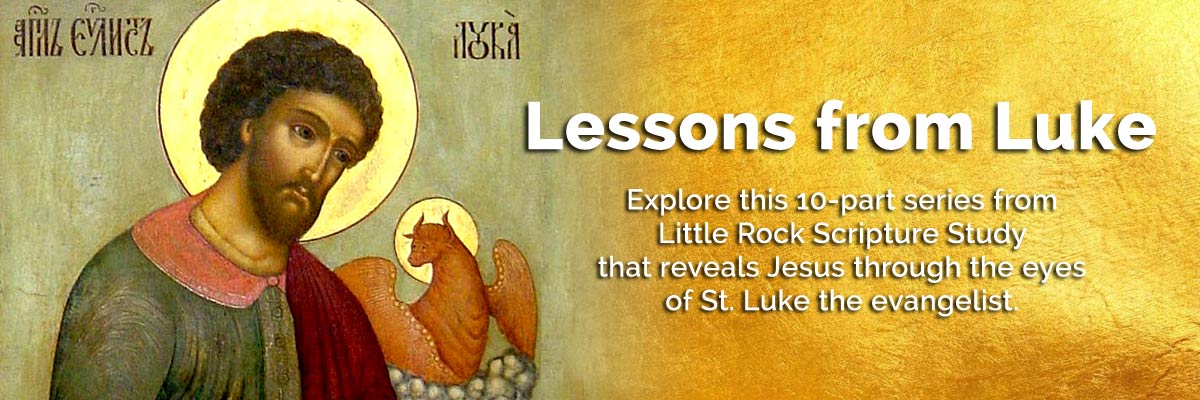Official Website of the
Catholic Diocese of Little Rock
Luke begins and ends in hope
Published: October 12, 2019
This is the ninth column in a 10-part series.
By Cackie Upchurch
Retired Director of Little Rock Scripture Study
When we read any of the Gospels, we have a clear advantage: we know the ending. We know that the tension that takes Jesus to Jerusalem will lead to his death. We know that his death will be misunderstood and mourned deeply, but we also know that death is not the final stanza of his song. We know that Jesus will rise from the dead and that his resurrection will change history. We know that the music of salvation will play on. Such prior knowledge no doubt affects how we receive the story. Our hearing of familiar passages in the Sunday Masses at our parishes, and our more careful reading in study groups or in the privacy of our own homes, can become rather mundane. The challenge, then, is to read and listen to the Good News with “fresh ears,” and imagine what it must have been like to live the events without that prior knowledge of the surprise ending.
Such prior knowledge no doubt affects how we receive the story. Our hearing of familiar passages in the Sunday Masses at our parishes, and our more careful reading in study groups or in the privacy of our own homes, can become rather mundane. The challenge, then, is to read and listen to the Good News with “fresh ears,” and imagine what it must have been like to live the events without that prior knowledge of the surprise ending.
The original followers of Jesus could not have known what they were getting into, and even as it became obvious that Jesus’ message was an affront to the religious powers of the region, they must have been devastated by his arrest, trial, and crucifixion. Their hopes for a kingdom of mercy and goodness, and a spirituality founded on profound freedom, were dashed in the most damaging way possible as their leader was publicly executed next to common criminals.
His closest followers would have wanted to honor him with a proper burial even as they surely wondered if anything he preached was true, and anything they witnessed would have staying power. And just as surely they would have been frightened by the alarming finality of his death. Maybe they even feared for their own safety.
In Luke’s version of the events following the death of Jesus, the women who had followed Jesus from the region of Galilee witnessed where his remains had been laid in a tomb (Luke 23:55–24:12). When the women returned to the burial spot after the Sabbath to anoint his body they found an empty tomb and two divine messengers who announced his resurrection. They even reminded the women, “Remember what he said to you while he was still in Galilee, that the Son of Man must be handed over to sinners and be crucified, and rise on the third day.”
We are told that “their story seemed like nonsense” to the apostles. And of course it would have. Who could have believed that he was alive? This is the question that leads us into one of the most poignant post-resurrection appearances of Jesus in the New Testament, the story of two of Jesus’ followers leaving Jerusalem on their way to Emmaus (Luke 24:13-35).
The two on the road were debating, perhaps even commiserating, about what had occurred in the previous days. When they were joined by a stranger they shared their confusion with him, giving witness to how “a prophet mighty in deed and word” had been put to death. They bemoaned, “We were hoping that he would be the one who would redeems Israel.” They even shared that the women had found an empty tomb, and it had been confirmed by some of the male apostles. But they departed Jerusalem where their hopes seemed to have been put to death.
The Gospel of Luke began with the message of hope for those who were among the least in this world: those who were barren, the poor and outcast, and all who were hungry or sick (recall the Canticle of Mary in 1:46-55 and the beginning of Jesus’ public ministry in 4:16-21). Here, at the close of the Gospel, even when all seems lost, hope returns in the appearance of the risen Lord who once again feeds his people with the hope of the kingdom and the nourishment they most need in teaching and sharing a meal in his presence.
The followers who left Jerusalem in sorrow are to return to the great city to spread the Good News. Their conviction and joy are bolstered by another appearance of the risen Lord among the apostles (24:36-49), another meal shared in his presence, and another time of teaching to prepare the early believers to be ambassadors of hope for a weary world.
Study Questions
- How do you attempt to hear the Gospel story with fresh ears? What practices help you to listen attentively on Sundays or read more carefully in your own private time?
- Is it possible for you to put yourself in the place of Jesus’ original followers? How are the footnotes in your Bible helpful in placing you in the situation during the time of Jesus?
- Read through the final two chapters of Luke’s Gospel (23–24). What particular verses or phrases in Luke’s version of these events speak powerfully to you? And why?
- When have you felt you were losing hope? And how has Jesus supplied the help you need in regaining your hope?
This article was originally published in Arkansas Catholic Oct. 12, 2019. Copyright Diocese of Little Rock. All rights reserved. This article may be copied or redistributed with acknowledgement and permission of the publisher.




